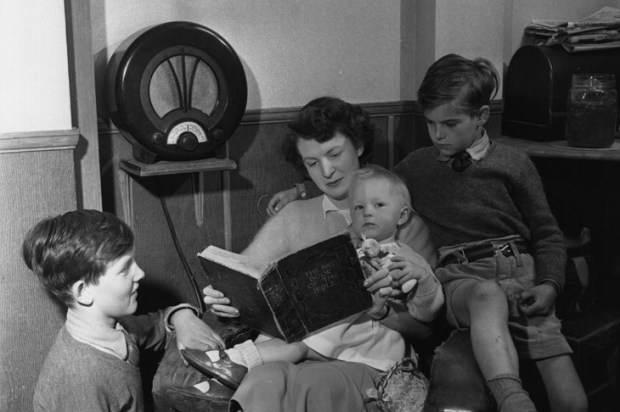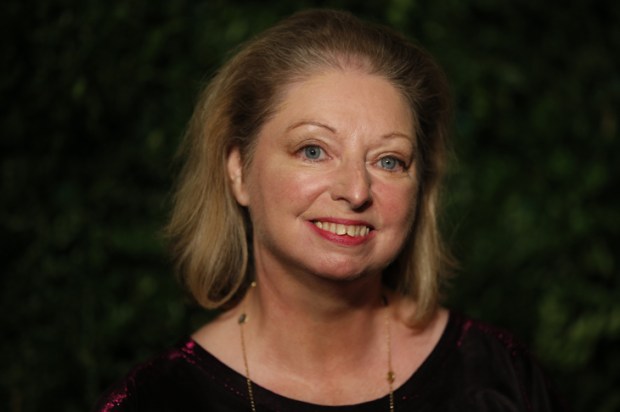It was a toss-up on Sunday between the atmosphere in the Radio Five Live Sports Extra studio in Kolkata for the last over of the cricket world cup (England versus West Indies) and the high-velocity drama of that evening’s episode of The Archers. Which was the more dramatic? In one room my husband was shouting at the radio, ‘Go on, Stokes!’ In another, an hour later, I was staggering towards an armchair, all thought of cooking dinner quite beyond me, after listening to the dénouement of the Helen and Rob story. Who would have thought radio could be so dangerous to the blood pressure?
In the heat of the moment, as the Eden Gardens stadium erupted, the exhilaration, and dismay, of Jonathan Agnew and co. was so intense you could not help but catch it through the airwaves. Just as electrifying was the scene at Blossom Hill Cottage in Ambridge as Helen finally plucked up the courage to tell Rob she was leaving him — without thinking first about what he might do when she told him or even where she might go. This seemed odd and frankly foolhardy. Her friend Kirsty, too, was worried. But still I did not suspect that what we’ve all wanted to happen for so long, worn out by our anxieties for Helen, was about to unfold.
Sure enough as soon as Rob saw the half-packed suitcase lying on their bed he went ballistic, fatally picking up a kitchen knife…Then it all became a bit confused and I’m still not sure what actually happened although by the time you read this we’ll presumably know the truth, or will we?
Was it ‘good’ drama? That depends. Some of the writing was superb as Rob switched from monster to charmer, twisting Helen into knots until she no longer knew what to think. But the introduction a few weeks ago of Rob’s mother (even more evil than him) never seemed to be true to the storyline, while Sunday-night’s episode was shocking not so much because of the script itself but because of what the writers made Helen do.
The most troubling thing about the Helen and Rob storyline, which has taken so long to build, is not that it almost feels real, so intimately has it invaded our kitchens and bedrooms, our thoughts, our headspace. But the realisation that we, the listeners, are the only witnesses to what actually happened not just on Sunday night but for much of the past few months. (The only other person to have overseen the horror is little Henry, that poor child born of donor insemination when Helen was still single.) We alone can tell the court how beastly Rob has been and that he deserved what he got. Three cheers for Helen. Except that if this were real life Helen’s future would not be at all cheery. Did she really carry on stabbing Rob, even after that first blow? Was she as crazed as she sounded?
I’m not sure I can bear to listen any longer to her pain, which must surely go on now for much longer. This, after all, is meant to be a soap, whose chief function is not to horrify but to make us feel better about ourselves by showing us lives that are just as banal and ordinary and unachieved as our own — and yet still worthy of being celebrated on air. Soaps help us to get through bad times not by wallowing in the bad, nor by avoiding it, but by showing us how to get through them by soldiering on. As I write, this doesn’t look much like an option for Helen.
You might have thought Sunday night’s episode was the end of the Rob and Helen affair. Not a bit of it. Things have just got a whole lot worse for Helen. And for Ambridge too. Can it survive this transformation into Scandi-style melodrama? I wonder. We’ve heard police sirens racing across the Green and followed ambulances rushing characters to casualty before. But an Archer had up for attempted murder? The fearless but ever-so-proper matriarch Peggy watching her granddaughter led off in the dead of night into a police car in handcuffs?
‘You aren’t going to kill anybody. People don’t do such things,’ says Gwen, the wife, in Denmark Hill (Radio 4, Saturday), a lost screenplay by Alan Bennett now turned into an offbeat radio drama by Honor Borwick (produced by Marilyn Imrie and directed by Tristram Powell). Gwen is talking to her son Charles, who has taken badly to the death of his father, and to Gwen’s sudden liaison with ‘Uncle George’. Meanwhile Gwen’s teenage daughter Harriet is struggling to write an essay about Shakespeare’s views on the family. At which point what seems to be an everyday story of suburban folk set in leafy south London with plain Harriet, bored Charles and boring Gwen and George begins to turn surreal.
In a series of short, staccato but beautifully paced scenes we find ourselves in a modern-day version of Hamlet complete with ghost, poisoned punchbowl and a stage full of dead bodies. This quietly disturbing dose of early Bennett has a stellar cast, too, with Bennett himself as a slightly sinister narrator, plus Robert Glenister, Geoffrey Palmer and Penny Downie.
Got something to add? Join the discussion and comment below.
Get 10 issues for just $10
Subscribe to The Spectator Australia today for the next 10 magazine issues, plus full online access, for just $10.














Comments
Don't miss out
Join the conversation with other Spectator Australia readers. Subscribe to leave a comment.
SUBSCRIBEAlready a subscriber? Log in